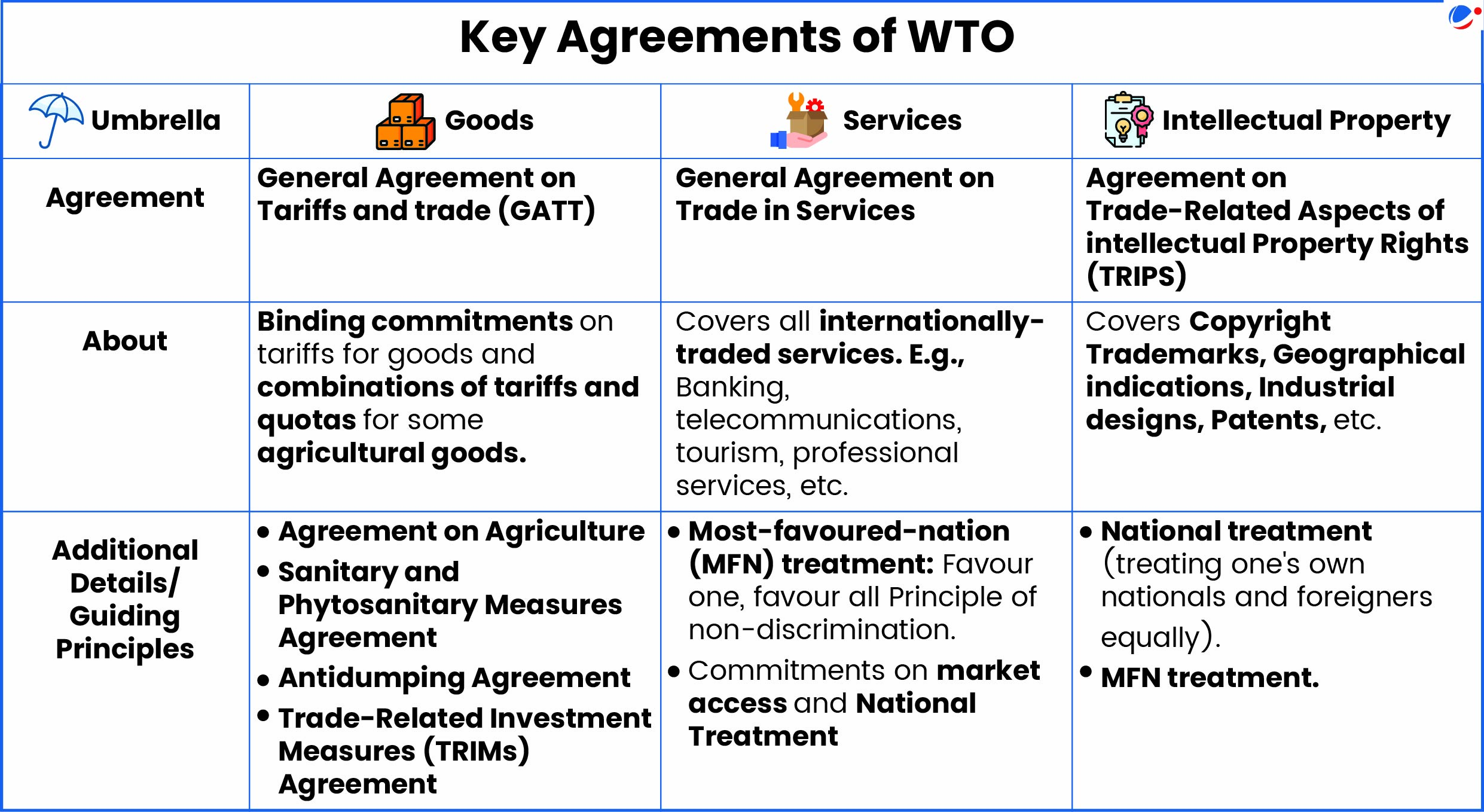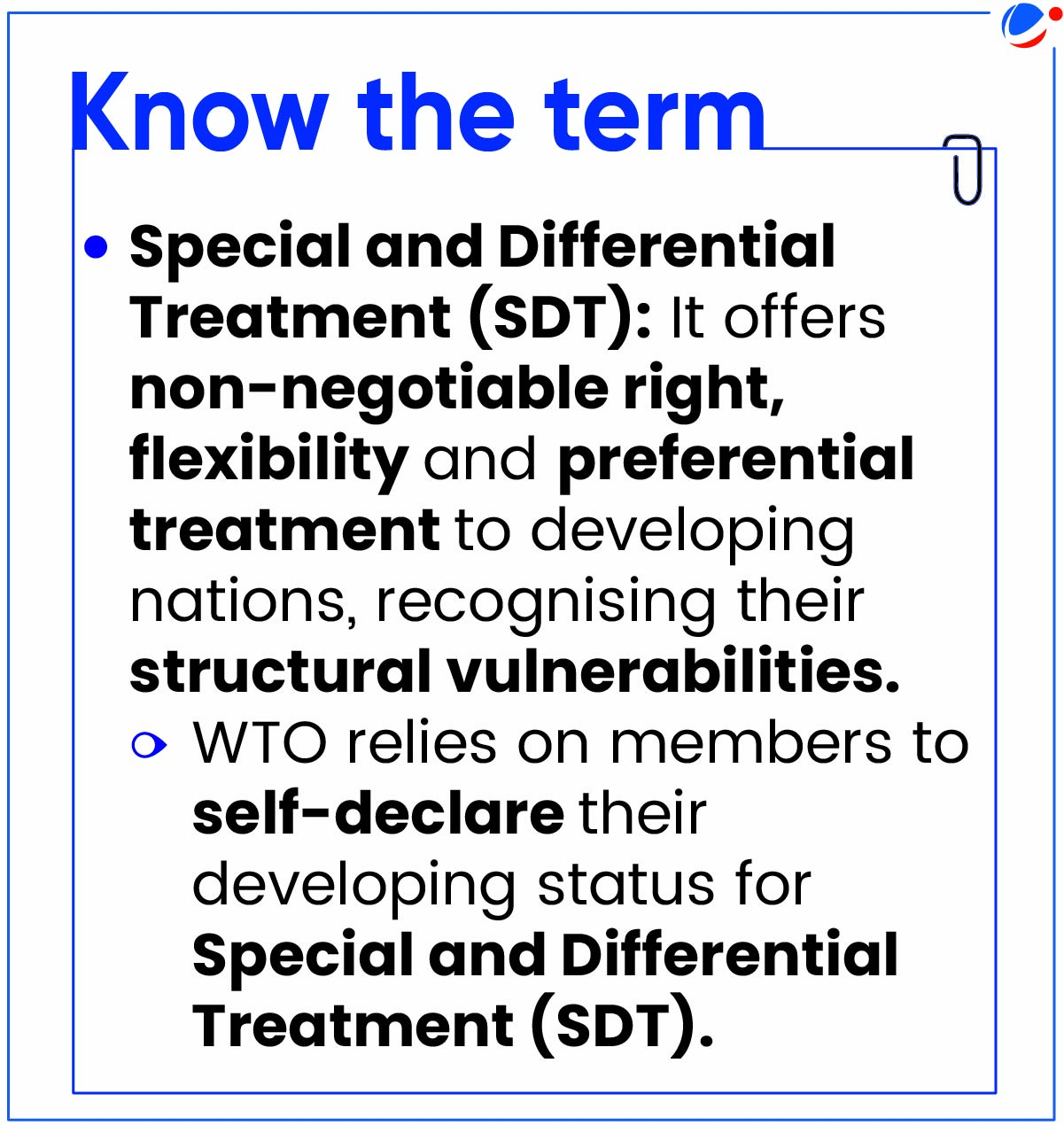Why in the News?
Recently, India called for reforms to the WTO during a high-level mini-ministerial meeting in Paris ahead of 14th Ministerial Conference in Cameroon, 2026.
About WTO
- Genesis:1995 post the Marrakesh Agreement.
- Successor to the General Agreement on Tariffs and Trade (GATT).
- 1986-94 Uruguay Round negotiations led to WTO's creation.
- Functions: Administering Trade Agreements, Forum for trade negotiations, settling trade disputes, reviewing national trade policies, building trade capacity of developing organisations.
- Members: 166 constituting 98% of World Trade. (India is a member since 1995).
- Decision Making: Based on Consensus.
- Ministerial Conference: Top-Level decision-making body meeting every two years.
- Secretariat: Geneva.

Key reforms demanded by India
- India's 3-pronged reform agenda-
- Tackling non-tariff barriers (NTBs) that restrict market access: It includes restrictions like import licensing, technical standards, complex customs procedures, etc.
- Addressing distortions caused by non-market economies: E.g., WTO rules are not sufficient to tackle China's state-support mechanisms which distort market competition and provide advantages to its domestic firms.
- Reviving the WTO's dispute settlement system: It has been paralyzed since 2016 due to U.S. opposition to appellate body appointments.
- Although India is skeptical of Multi-Party Interim Appeal Arbitration Arrangement (MPIA).
Other key priorities:

- JSIs (joint statement initiatives) (or) pluri-laterals: These allow only a few countries to negotiate on specific issues, which can lead to unfair treatment of others not involved.
- Some countries want JSIs to become part of the broader multilateral system, but India opposes as it may risk fragmenting the multilateral system.
- For example, India refused to join China-led talks on Investment Facilitation for Development.
- Some countries want JSIs to become part of the broader multilateral system, but India opposes as it may risk fragmenting the multilateral system.
- Permanent solutions for public food grain stockholding programs: In 2013, an interim "peace clause" allowed developing countries to provide subsidies under public stockholding programmes without being legally challenged in the WTO's dispute settlement system.
- Concerns of overfishing and indiscriminate fishing: Agreement on Fisheries (2022) is in deadlock as it has not received acceptance from two-thirds of WTO members to come into effect.
- India is not part of the agreement, raising concerns like-
- 25-year transition period: For developing countries under Special and Differential Treatment (SDT).
- 'Polluter pay principle' and 'common but differentiated responsibilities': More obligation to prohibit subsidies on members historically granting huge subsidies, and engaged in large-scale industrial fishing.
- India is not part of the agreement, raising concerns like-
Other Contentious issues at WTO
|
Way Forward
- Ensuring developing countries have a say in decision-making processes along with addressing their concerns over issues like cultural subsidies, intellectual property, etc.
- Strengthen monitoring and notification systems for NTBs to improve transparency and reduce misuse.
- Develop clear rules to prevent fragmentation caused by plurilateral agreements and ensure they do not undermine the multilateral system.
- Explore alternative interim dispute resolution models.
- Address trade distortions arising from state-owned enterprises and industrial subsidies, ensuring a level playing field.
- Guiding Principles like the Paris Agreement's "Common but Differentiated Responsibilities" should be adopted to prevent unjust application of trade obligations on the developing countries.
Conclusion
While the WTO has been instrumental in expanding and regulating international trade through a rules-based system, its effectiveness is currently undermined by issues like non-tariff barriers, trade distortions, and stagnated dispute settlement system. India's call for reforms encapsulates the aspirations of many developing and least-developed countries seeking a fair, transparent, and inclusive multilateral trading system.






